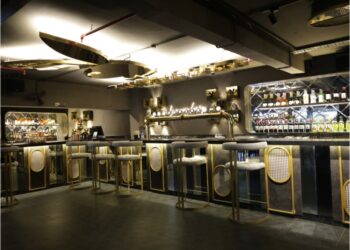THIS ARTICLE IS BROUGHT TO YOU BY

-Khwaish Hingad(cbedit@imaws.org)
In the dynamic realm of catering, a delicate dance unfolds as businesses navigate the convergence of tradition and innovation to cater to an evolving clientele. This multifaceted journey hinges on striking a harmonious balance between time-honored cooking techniques and the burgeoning demand for avant-garde culinary experiences.
Central to this landscape is the ever-growing call for healthier, sustainable food options. Sustainability has transcended being a mere trend; it’s a core ethos. Catering companies have embraced eco-conscious practices, championing local sourcing and waste reduction. They craft menus that not only tantalize taste buds but also align with the principles of responsible sourcing, minimizing their environmental footprint.
In an era marked by diverse dietary preferences and restrictions, inclusivity is paramount. Caterers have become adept at tailoring menus to transcend traditional boundaries, accommodating various dietary needs, including vegetarian, vegan, gluten-free, and allergen-sensitive options.
Yet, this journey is not without challenges, including labor shortages, rising costs, and stringent food safety regulations. However, adaptability and creativity have become the industry’s guiding lights, propelling it forward into a more delectable, sustainable, and inclusive future.Let’s dive into what the industry experts have to say about it.
Food Safety and Hygiene Regulations:
How is the catering industry navigating regulations and guidelines related to food safety and hygiene, and how do these considerations impact business operations?

Sharing his thoughts on this question, Mr. Narendra Somani, President, of The Grand Bhagwati Banquets & Hotels. stated, “The government, along with the catering industry and the BFSI, is training us with various courses to help us maintain better hygiene in the catering industry. They share program videos to train people on how to maintain hygiene in the catering industry.
With the growth of social media, people are also more serious about maintaining hygiene. Customers are more likely to choose a catering company that they believe has high hygiene standards.
We take special care to ensure that there are enough trash cans at large-scale events, such as parties with 2,000 people. This way, people don’t have to struggle to dispose of their plates or other waste. We also take out the waste immediately when it is full. We also take care to minimize waste as much as possible. We don’t try to use too many disposable plates.”
Addressing Labor Shortages and Costs:
What strategies are catering businesses using to address labor shortages and rising labor costs?

On this another player in the catering industry, Pruthviraj Rajpurohit, MD & Master Chef of PRUTHVI – A Luxury Catering, commented, “With an impressive 40-year legacy in the culinary industry, we’ve consistently circumvented labor shortages by upholding stringent labor ethics and equitable payment practices. Central to our success is featuring a departmental structure with hierarchies led by head chefs and team leaders. This setup allows efficient team management, with each leader overseeing ten individuals, and it easily scales to meet demands. Our extensive workforce of over 800 laborers functions as a powerful network, swiftly mobilizing additional manpower when required.
We’ve earned a reputation for maintaining a positive work environment, competitive pay scales, and clearly defined duty allocations, which attract and retain talent. Understanding the challenges faced by newcomers in grasping prevailing pay scales, we continue to utilize traditional payment structures, simplifying workforce management.
Adapting to industry trends, we’re gradually incorporating automation through machinery to enhance efficiency and reduce dependency on extra labor. Unlike some competitors favoring central kitchens, we endorse the live kitchen concept, eliminating the need for redundant teams.
Our deep knowledge of local clusters has proven vital. We tailor our recruitment strategies to tap into specific culinary skills concentrated in certain regions. Our recent achievement of assembling a team of 800 individuals within six hours underscores the strength of our network and the effectiveness of our approach.”
Reducing Waste and Sustainability:
What steps are caterers taking to reduce waste and improve sustainability, despite challenges?
“In the face of the growing trend towards central kitchens, we’ve devised strategies to minimize food wastage and ensure operational efficiency. While central kitchens often require 20-25% extra food to accommodate potential increases in guest numbers, our live kitchen approach allows us to keep raw materials on hand and prepare dishes as needed, significantly reducing wastage while providing a backup for unexpected surges in guests.
To combat the practice of chefs adding extra items to menus, we advocate having an F&B specialist or menu planner who meticulously outlines the required ingredients for each dish, eliminating unnecessary raw material waste. Our focus on precise ingredient lists ensures optimal resource management.
We also pay attention to service setup to minimize food wastage. Proper portion control and multiple food counters prevent guests from overloading their plates, contributing to less waste.
Ultimately, sustainability encompasses not only food quality but also taste, presentation, and service. By following these strategies and optimizing fixed costs, businesses can thrive, attract more customers, and remain competitive in the market.” This was also emphasized by Mr. Rajpurohit on reducing wastage and sustainability.
Differentiation and Client Attraction:
What creative strategies are caterers using to differentiate themselves in a crowded market and attract clients for events of varying scales?

Further continuing to shed light on the industry, Ridhi Choudhary, Director, Mann & Salwa shared her views, stating, “Mann & Salwa contributes to luxury catering as we own a huge and world-class set up of 25,000 sq ft warehouse and 10,000 sq ft kitchen, the largest in the state of Gujarat.
We have an experience center wherein the clients can visit to indulge in food tastings, experience the offerings, and take a tour of our international standard kitchen with food processing facilities, bakery, cuisine-specific food production areas, cold rooms, vegetable processing area, staff training facility, staff rooms, and offices. We are highly equipped in terms of operations and talent. We don’t rely on outsourcing as we have everything in-house from food to equipment and display.
We differentiate ourselves and attract clients with unique menu curations, strategically managing human resources to offer quality interactive services and to meet customers’ emotional perceptions, beautiful setups that go along with the decor, attractive Pre Plating of Food that is eye appealing and we deliver gourmet, fantastic and delectable food & experience with consistency maintained in any scale of event ranging from 50 to 5000 persons.”

Mr. Aman Patel, Founder, of The Light Sapphire catering service, has candidly acknowledged the challenges of securing clientele in today’s fiercely competitive landscape, he added, “In the current competitive landscape, venturing into the catering and food industry presents unique challenges, primarily due to the proliferation of providers offering cost-effective solutions while often compromising on service quality.
However, at Light Sapphire, we stand apart by unwaveringly adhering to our commitment to excellence in both cuisine and service. We firmly believe in customizing our offerings to meet the distinct needs and preferences of our valued clients. This ensures that every event we cater to is a resounding success, leaving our customers delighted with their experience. Our unwavering dedication to maintaining the highest standards in gastronomy and hospitality is what sets us apart in this dynamic industry.”
Challenges and Opportunities in Large-Scale Events:
What challenges and opportunities arise when catering for large-scale events, and how do businesses ensure a seamless experience for attendees?
Mr. Somani further elaborated on challenges and opportunities saying, “The main challenge we face is manpower and labor. We rely on them for all of our daily work and processes, to the tune of 95-98%. This is because we hire staff on a contractual basis.
Whenever we have an event, we have to train the staff from scratch. This is because each event has a different agency and different staff. We need to make sure that they follow our protocols and work methods consistently.
To address this challenge, we have in-house supervisors and head chefs who keep everything in order. They train the staff and monitor their work.
When we overcome these challenges, people see our quality and we get more business, including big events. This is because we offer great value to our customers. Large events are also an opportunity for people to see our management and processes. We can also cater to large parties for short-term events.
I believe that anything is possible at TGB. We have the skills and the determination to make anything happen. We proved this during the COVID-19 pandemic when many businesses were forced to close. We managed to stay afloat and even grow our business.”
Inclusive Menus for Dietary Preferences:
With the rise of dietary restrictions and preferences, how are catering companies managing the intricacies of creating inclusive menus?
Lastly sharing her views on the guests’ dietary preferences, Ms. Choudhary said, “With the rise of dietary restrictions and preferences the catering has changed dramatically. Personalized care has to be taken into consideration in hosting dietary restrictions and allergies people deal with from gluten-free, and nut allergies, to vegan, etc. We cater effectively to customers with food intolerances and special requests as we make dietary restrictions a key part of communication with clients while curating the menu and planning the menu with the restrictions in top-of-mind.
We have a complete station with items served considering allergies as it makes guests with special requests feel less awkward or we create several versions of the same food items, accommodating the requests, and showcasing our culinary expertise.
We have dishes respecting food sensitivities to be just as amazing as the mainstream menu. We accommodate guests’ requirements with grace, skill, and practical know-how. We always have a backup plan as and when guests fail to inform the host about dietary requests and prepare special requests on the fly.
Food allergies are on the rise and food preferences are diverse. As a result, catering to these requests with thoughtfulness and preparedness is a necessity in the industry.”
The catering industry’s evolution is a delicate balance between tradition and innovation. Sustainability, inclusivity, and adapting to regulations define its path forward. While challenges like labor shortages persist, creativity and adaptability propel the industry to new heights. Caterers strive to offer unique experiences and address dietary preferences, ensuring a seamless journey for clients, even in large-scale events. This dynamic landscape is a testament to the industry’s resilience and commitment to delivering exceptional culinary experiences while championing responsible practices.
ADVERTISEMENT









